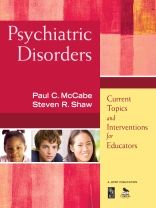’This book focuses on educational implications of Tourette syndrome, bipolar disorder, mood disorders, eating disorders, and other issues, as well as pediatric medications and side effects. The well-organized chapters include research reviews, educational strategies, handouts, and discussion questions and are valuable resources for school psychologists, teachers, administrators, nurses, and others.’
—Patti L. Harrison, President, National Association of School Psychologists
Professor of School Psychology, The University of Alabama, Tuscaloosa
The educator′s go-to reference for important psychiatric health topics!
Increasingly, educators are called upon to address children′s medical as well as mental health needs within the school setting. Based on a critical review of current research, this concise, highly practical volume outlines the most relevant psychiatric health issues for educators today.
Written for school psychologists, counselors, administrators, and teachers, this easy-to-understand resource covers:
- Neuropsychiatric conditions that commonly affect children, including Tourette syndrome, bipolar/mood disorders, and anxiety disorder
- Psychopharmacology, including the use of atypical antipsychotics and autism, the treatment of tardive dyskinesia in children, the medical management of ADHD, polypharmacy prescription practice, and side effects of common health medications
- Dietary control and supplement use that includes dietary treatments for autism, identification and treatment of eating disorders, and use of steroids in adolescence
Featuring case studies, strategies for educators, discussion questions, glossaries, and handouts, Psychiatric Disorders provides valuable information to practitioners involved in providing differentiated instruction and educational accommodations, offering special education services, collaborating with families, working with the community, or influencing policy.
Spis treści
Preface
Acknowledgments
Part I. Neuropsychiatric Conditions Affecting Children
1. Developments in Neuropsychiatric Treatment: New Challenges and Old Problems – Paul C. Mc Cabe, Steven R. Shaw
Introduction
Linking Neurotransmitters to Behavior
Increasing Specificity of Medications
Medication Side Effects
(De-) Emphasis on Talk Therapies
Future Directions
References
2. Neurochemical Bases of Tourette Syndrome and Implications for Educators – Jason Collins, Paul C. Mc Cabe
Introduction
Glossary
Literature Review
Prevalence and Epidemiology
Clinical Phenomenology
Comorbidity
Neurochemical Bases
Implications for Educators
Educational Strategies
Discussion Questions
Research Summary
Handout-Tourette Syndrome
3. Diagnosis and Treatment of Pediatric Bipolar Disorder – J. Elizabeth Chesno Grier, Megan L. Wilkins, Elizabeth Jeffords
Introduction
Glossary
Literature Review
Symptoms of bipolar Disorder
Differential Diagnosis
Interventions for Pediatric Bipolar Disorder
Medical Management
Psychosocial Interventions
Conclusions
Implications for Educators
School-based Interventions
Educational Strategies
Discussion Questions
Research Summary
Handout-Pediatric Bipolar Disorder
4. Parental Control Effects on Separation Anxiety Disorder in Children – Erica E. Levavi, Florence J. Schneider, Paul C. Mc Cabe
Introduction
Glossary
Literature Review
Behavioral Control
Parental Anxiety
Parental Affection
Discipline
Psychological Control
Cultural Differences
Parental Factors
Implications for Educators
Prevention
Intervention
Educational Strategies
Discussion Questions
Research Summary
Handout-Interventions for Children with Separation Anxiety Disorder
5. Mood Disorders and Creativity – Sara Pollak-Kagan, Paul Mc Cabe
Introduction
Glossary
Literature Review
Link Between Bipolar Disorder and Creativity
Neurobiological and Genetic Model
Implications for Educators
Educational Strategies
Discussion Questions
Research Summary
Handout-Use of Creative Mediums with Children and Adolescents with Mood Disorders
Part II. Psychopharmacology
6. Atypical Antipsychotic Use in Children and Adolescents with Autism Spectrum Disorders: A Review for Educators – Steven R. Shaw, Tamara Dawkins
Introduction
Background
The Effects of Atypical Antipsychotic on Symptoms of ASD
Agression
Hyperactivity
Mood
Cognition
Side Effects
Clozapine
Olanzapine
Risperidone
Quetiapine
Ziprasidone
Conclusions
Educational Strategies
Discussion Questions
Research Summary
Handout-Use of Atypical Antipsychotic Medication with Children and Adolescents
7. Tardive Dyskinesia with Typical and Atypical Antipsychotic Medications in Children and Adolescents – Daniel Farrell, Janine Fischer, Paul C. Mc Cabe
Introduction
Background
Symptoms and Prevalence
Prevalence of TD
Treatment of TD
Implications for Educators
Educational Strategies
Discussion Quesitons
Research Summary
Handout-Tardive Dyskinesia
8. Recent Advances in the Medical Management of Children with Attention-Deficit/Hyperactivity Disorder – John S. Carlson, Angela Maupin, Tara Brinkman
Introduction
Background
Psychostimulants
Atomoxetine
Novel and Alternative Medicines
Conclusion
Implications for Educators
Educational Strategies
Discussion Questions
Research Summary
Handout-Recent Advances in the Medical Management of ADHD
9. Polypharmacy Prescription Practices in School-Aged Populations: Challenges and Considerations – John S. Carlson
Introduction
Background
Overview and Definitions
Risks Associated with Polypharmacy
Assumptions Associated with Polypharmacy
Medication Use in School-aged Populations
Medication Use within Vulnerable Populations
Prevalence of Polypharmacy in Childhood Populations
Cultural Considerations and Polypharmacy
Interventions
Combined Medication Approaches
Monitoring Combined Medication Treatments
Implications for Educators
Educational Strategies
Discussion Questions
Research Summary
Handout- Polypharmacy Prescription Practices in School-aged Populations
10. Educational Implications of Commonly Used Pediatric Medications – Larry M. Bolen, Michael B. Brown
Introduction
Background
Medication Issues
Non-specific Medication Side Effects
Issues Specific to Medications for Treatment of Asthma
Issues Specific to Medications for Pain and Fever
Issues Specific to Medications for Cough and Colds
Implications for Educators
Assessment
Intervention
Advocacy and Education
Conclusion
Educational Strategies
Discussion Questions
Research Summary
Handout- Medication Effects in Children
Part III. Diatary Control and Supplement Use
11. Dietary Modification in the Treatment of Autism Spectrum Disorders – Caryn R. Depinna, Paul C. Mc Cabe
Introduction
Background
The GFCF Diet
Research Limitations
Conclusion
Implications for Educators
Educational Strategies
Discussion Questions
Research Summary
Handout-Dietary Modification: The Gluten-Free Casein-Free Diet
12. The Prevention and Intervention of Eating Disorders – Catherine Cook-Cottone
Introduction
Background
Etiology Research Brief
Neurological Findings
Other Contributing Factors
Prevention and Intervention Support
Eating Disorder Prevention Practices and the Three Tiered Service Delivery Model
Universal Prevention
Targeted Prevention
Identify At-risk Individuals
Make Referrals/Be Aware of Resources
Intervention Overview
Implications for Educators
School Reintegration
Educational Strategies
Discussion Questions
Research Summary
Handout-Prevention and Intervention of Eating Disorders
13. Steroids in Adolescents: The Cost of Achieving the Physical Ideal – Sarita Gober, Paul Mc Cabe
Introduction
Background
Steroid Use and Effects
Gender-specific Health Risks
Physiological Health Risks
Psychological and Behavioral Risks and Effects
Withdrawal
Prevalence of Steroid Use
Reasons for Steroid Use
Typology 1: Sports and Physical Performance Improvement
Typology 2: Appearance
Typology 3: Illicit Drug Use and Other Risky, Sensation-Seeking Behaviors
Implications for Educators
Educational Strategies
Discussion Questions
Research Summary
Handout-Anabolic Steroid Use Among Adolescents
Appendix
Glossary
References
Index
O autorze
Steven R. Shaw, NCSP, is an assistant professor in the Department of Educational and Counselling Psychology at Mc Gill University in Montreal, Quebec. He has been a school psychologist since 1988 with clinical and administrative experience in schools, hospitals, and independent practice. He has conducted workshops and consulted with educational policy makers to address the needs of children with borderline intellectual functioning in the US, Canada, Pakistan, Moldova, Poland, India, and Egypt. Shaw conducts and publishes research in behavior and language development in children with rare genetic disorders; resilience factors for children with risk factors for school failure, especially borderline intellectual functioning; and pediatric school psychology and health issues addressed by schools. Shaw received a Ph D in school psychology from the University of Florida.












